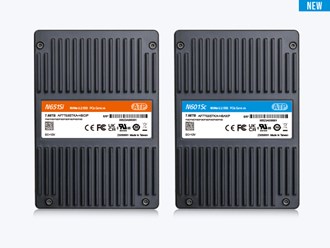Tech Talk
ATP’s Game-Changing Gen4 SSD: 8 TB, 11,000 P/E Endurance

Last updated 20 August 2025
Blazing-Fast, Built to Last
When we think about storage, it’s tempting to focus purely on speed or capacity. But in industries where devices are under constant pressure - whether from extreme temperatures, heavy workloads, or unrelenting write cycles -endurance is the kingmaker.
That’s exactly where ATP Electronics’ new N651Si/N651Sc series NVMe Gen4 SSDs stand out. With up to 11,000 program/erase (P/E) cycles - a 120% improvement over their own previous generation - ATP has set a new benchmark for industrial-grade SSDs. And they’ve managed to pack this into drives with capacities up to 8 TB.
How did ATP push the limits?
Endurance gains like this don’t just happen. ATP attributes their achievement to a multi-layered strategy:
- Prime NAND selection: Using only the highest-quality 512 Gb packages, thoroughly validated.
- Rigorous testing: Every batch undergoes performance, endurance, data retention, temperature, and read-disturb screening.
- Firmware expertise: In-house engineering fine-tunes how the SSD handles workloads, wear levelling, and error correction.
- Thermal resilience: With operating ranges from –40 °C to 85 °C (for the I-Temp variant), these drives won’t blink in harsh industrial or edge environments.
This is a holistic approach: hardware, software, and testing working together to extract more life from NAND flash.
Performance in the Real World
On paper, ATP’s 8 TB M.2 model delivers up to 119% faster sequential write speeds and 32% better sustained writes compared to competing solutions. But what does that mean in practice?
- Continuous logging: Think of IoT devices or transport systems recording data 24/7. Faster sustained writes keep the buffer clear, avoiding bottlenecks.
- Video capture and surveillance: Long writes are typical - endurance means fewer replacements, while speed ensures no frame drops.
- Edge AI deployments: Local data processing at the edge requires both bandwidth and endurance. These SSDs are designed to thrive under AI inference workloads.
It’s not just about being the fastest once - it’s about being consistently reliable over years of use.
The Cost Equation: Why Endurance Matters
One drive with higher endurance can be more cost-effective than several replacements of a cheaper SSD. ATP’s 1 Drive Write Per Day (DWPD) rating, achieved with just 7% overprovisioning, ensures predictable performance over the product’s life cycle.
For businesses, that translates to:
- Lower total cost of ownership (TCO): Fewer swap-outs, less downtime.
- Predictability: Knowing a drive will last its warranty period reduces operational risk.
- Sustainability: Fewer replacements means less e-waste - a growing consideration for many companies.
Versatility Across Form Factors
ATP has also broadened deployment options. The N651Si/N651Sc family isn’t limited to M.2. Customers can choose from U.2, E1.S, CFexpress, and even industrial SD/microSD options - ensuring compatibility across server, embedded, and portable platforms.
- This versatility makes the technology equally at home in:
- Data-intensive edge servers
- Industrial automation controllers
- Rugged portable devices used in oil, gas, or field research
- Military and aerospace systems
Key Specs at a Glance
| Feature | Detail |
| Endurance | 11,000 P/E Cycles |
| Capacity | Up to 8 TB |
| Performance | +119% sequential writes, +32% sustained writes |
| Thermal Range | –40 °C to 85 °C (I-Temp) |
| Form Factors | M.2, U.2, E1.S, CFExpress, SD/MicroSD |
| Use Cases | Write-intensive, rugged, edge/industrial |
In Summary
ATP’s new NVMe Gen4 SSD family combines massive capacity, blazing performance, and industry-leading endurance. By pushing TLC NAND to levels typically reserved for SLC or MLC, ATP is proving that industrial storage can keep up with the relentless pace of modern workloads - without compromising reliability.
For any business grappling with data-heavy, write-intensive, and harsh-environment deployments, these drives are more than just storage. They’re long-term investments in stability and performance.